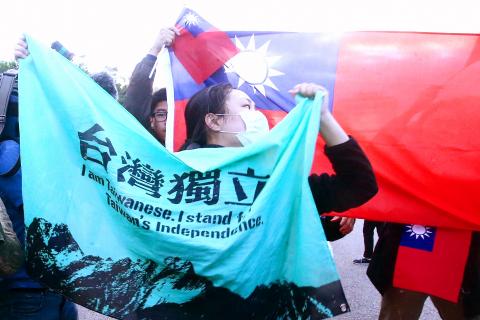Members of the pro-independence Taiwan Radical Wings party were evicted from a New Year’s Day ceremony in front of the Presidential Office Building for waving flags promoting Taiwanese independence yesterday, while the party accused the authorities of failing to protect free speech.
Party members participating in the ceremony displayed a “flag of Taiwan” and an “independence flag,” causing a confrontation with police.
Police officers said that only the national flag was allowed at the ceremony, and evicted several party members and volunteers, while some attendees displaying flags advocating marriage equality were allowed to stay.

Photo: CNA
“Is it not the most typical form of infringement on the freedom of speech that the state treats different opinions differently?” the party said in a statement.
No party members were injured, although a telephone was broken during the eviction, party deputy publicity director Lin Chun-miao (林春妙) said.
The police did not respond to party members’ accusations that they were treated unfairly compared with equal marriage rights advocates who waved rainbow flags, Lin said.
Citing President Tsai Ing-wen’s (蔡英文) address after winning the presidential election that promised “no citizens have to apologize for their identification,” the party said the eviction of people publicly professing their political stance was counter to the president’s pledge.
The Executive Yuan last month announced Freedom of Expression Day to mark the death of democracy activist Deng Nan-jung (鄭南榕), but yesterday’s eviction was a bitter irony considering the government’s pledge to ensure the freedom of speech, the party said.
The government has tried to silence the independence movement by identifying the Republic of China (ROC) with Taiwan and vice versa, while the commemoration of Deng’s death with Freedom of Expression Day might do away with Deng’s legacy as a pro-Taiwanese-independence activist, it said.
“As long as Taiwanese independence narratives remain a taboo for the government, there is no true freedom of speech in Taiwan. As along as the Democratic Progressive Party [DPP] administration does not face the alien characters of the ROC system, it remains an accomplice of the Chinese settler regime,” the party said.
Meanwhile, a Changhua County man held a flag-raising ceremony using China’s national flag during which which China’s national anthem was played.
Wei Ming-jen (魏明仁), a former military officer who is now in the construction business, acquired a Buddhist temple in the county’s Ershuei Township (二水) six years ago and converted it into a “socialism and nationalism outpost of the People’s Republic of China.”
Wei invited “comrades and unificationists” to join yesterday’s ceremony, with about 200 people in attendance, including reporters from China.
Wei said he is a Chinese citizen and is working toward Taiwan’s unification with China, adding that he burned his Taiwanese identification and Chinese Nationalist Party (KMT) membership cards.
Changhua County Commissioner Wei Ming-ku (魏明谷) of the DPP said he has asked police to monitor Wei Ming-jen’s networking activities, although it was not worthwhile to trouble himself with a person who betrays his nation and repurposes a temple for political aims.
“If he has the courage, he should go and raise the ROC national flag in China,” the commissioner said.
The Mainland Affairs Council said it does not comment on the political views of individuals, adding that identification with the ROC is the most widely accepted political view among Taiwanese.
Additional reporting by Yen Hung-chun and CNA

Taiwan has received more than US$70 million in royalties as of the end of last year from developing the F-16V jet as countries worldwide purchase or upgrade to this popular model, government and military officials said on Saturday. Taiwan funded the development of the F-16V jet and ended up the sole investor as other countries withdrew from the program. Now the F-16V is increasingly popular and countries must pay Taiwan a percentage in royalties when they purchase new F-16V aircraft or upgrade older F-16 models. The next five years are expected to be the peak for these royalties, with Taiwan potentially earning

STAY IN YOUR LANE: As the US and Israel attack Iran, the ministry has warned China not to overstep by including Taiwanese citizens in its evacuation orders The Ministry of Foreign Affairs (MOFA) yesterday rebuked a statement by China’s embassy in Israel that it would evacuate Taiwanese holders of Chinese travel documents from Israel amid the latter’s escalating conflict with Iran. Tensions have risen across the Middle East in the wake of US and Israeli airstrikes on Iran beginning Saturday. China subsequently issued an evacuation notice for its citizens. In a news release, the Chinese embassy in Israel said holders of “Taiwan compatriot permits (台胞證)” issued to Taiwanese nationals by Chinese authorities for travel to China — could register for evacuation to Egypt. In Taipei, the ministry yesterday said Taiwan

Taiwan is awaiting official notification from the US regarding the status of the Agreement on Reciprocal Trade (ART) after the US Supreme Court ruled US President Donald Trump's global tariffs unconstitutional. Speaking to reporters before a legislative hearing today, Premier Cho Jung-tai (卓榮泰) said that Taiwan's negotiation team remains focused on ensuring that the bilateral trade deal remains intact despite the legal challenge to Trump's tariff policy. "The US has pledged to notify its trade partners once the subsequent administrative and legal processes are finalized, and that certainly includes Taiwan," Cho said when asked about opposition parties’ doubts that the ART was

If China chose to invade Taiwan tomorrow, it would only have to sever three undersea fiber-optic cable clusters to cause a data blackout, Jason Hsu (許毓仁), a senior fellow at the Hudson Institute and former Chinese Nationalist Party (KMT) legislator, told a US security panel yesterday. In a Taiwan contingency, cable disruption would be one of the earliest preinvasion actions and the signal that escalation had begun, he said, adding that Taiwan’s current cable repair capabilities are insufficient. The US-China Economic and Security Review Commission (USCC) yesterday held a hearing on US-China Competition Under the Sea, with Hsu speaking on